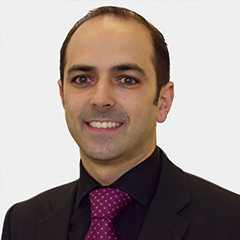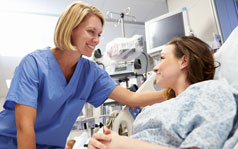Breast Reduction
Contact Us
Request an AppointmentPlease note that a referral letter is required before an appointment can be confirmed.
Please note that a referral letter is required before an appointment can be confirmed.
Useful Information
About our services
Breast reduction surgery is a procedure to reduce the size and weight of your breasts and potentially to give them a better shape.
Women who have large breasts may experience a variety of problems, both physical and psychological, caused by the weight and size of their breasts. These problems include back pain, neck pain, shoulder pain, skin irritation, self-consciousness and the inability to participate in sport. Breast reduction is usually performed for relief of these symptoms.
We offer consultant led service only - ensuring you not only receive the best expertise and experience but that you also have all the clinical care and backup needed. If you decide to go ahead, a specialist pain nurse is also involved in your care to help manage pain while in hospital and following your discharge.
Irrespective of the reasons for deciding to undergo breast reduction surgery, our goal is to create the desired appearance, symmetry and balance that you are looking to achieve with natural looking results.
What to expect
If you have decided to go ahead with breast reduction, your plastic or breast surgeon will take you through what to expect and any specific instructions.
For two weeks before surgery it is important to avoid aspirin or non-steroidal anti-inflammatory drugs such as ibuprofen (Brufen/Nurofen ) and diclofenac (Voltarol). These drugs reduce the ability of the blood to clot and can make bleeding more of a problem during and after surgery.
Smoking can increase the likelihood of wound problems and abstaining from smoking for at least two weeks before and after surgery is a sensible precaution.
On the morning of your procedure you will meet with your surgeon who will discuss the procedure and answer any questions you may have. There will be marks drawn on your skin to help with with procedure. These will wash off.
You will also meet with the anaesthetist who will talk you through the anaesthetic. The procedure takes place under general anaesthetic so you will be asleep and local anaesthetic will be given to reduce any post-operative discomfort.
When you are ready, you will be taken to the theatre where your procedure will take place. You will be in theatre for approximately one hour.
An incision around the nipple (areola) and vertically down from it. Your surgeon will remove some of the breast tissue, excess fat and skin. They will then reshape your breast and reposition your nipple.
It is important to rest, avoid strenuous activity and wear a support bra for six weeks. Your breast will be discoloured and swollen initially.
Your breast reduction procedure is carried out by a highly experienced surgeon who works to achieve good results with a rapid recovery. However, as with any surgical procedure, there is a small risk of complications including the following:
Unfavourable scars
Some form of scar will always be present and most patients find that the scars settle well in time. In some patients, scars can be thicker or raised. In most cases, these settle spontaneously but occasionally other measures to improve the scar may be necessary.
Infection
Infection is rare in this type of surgery and the risk is minimised by careful surgical technique. You will receive antibiotics before and after surgery to further reduce the risk. Where infection affects the implant (perhaps 1% of cases) it may be necessary to remove the implant to allow the infection to clear.
Nipple sensation
Many people find that there is some change in nipple and breast sensation after breast reduction. A minority find sensation is reduced, though this tends to improve with time.
Haematoma
Rarely, small blood vessels in the wound may bleed after the surgery, leading to a collection of blood under the wound (a haematoma). This will need to be released and washed out before resuturing (stitching) the wound. If this problem arises, it is typically on the day of surgery and does not affect the final result.
Chest infection and DVT
Any surgery carried out under general anaesthetic carries a small risk of post-operative chest infection, particularly in smokers, and of thrombosis of the leg veins (DVT) and the concomitant risk of clot moving to the lung (embolism). Patients wear protective stockings during and after surgery to help minimise the risk of DVT and embolism. Early mobilisation after surgery is an excellent way of reducing the risk. We also use a compressive massaging device on the calf muscles in theatre to further reduce the small risk of this complication.
What happens during breast reduction surgery?
During breast reduction surgery, excess breast fat and skin tissue are removed and the breasts are re-shaped and repositioned.
Will there be scars?
There are usually two incisions, one, around the nipple and the other just under the breast in the inframammary fold. Our plastic surgeons are highly experienced in minimising scarring. Depending on what works best for you, we will discuss the possibility of scars at your consultation. In the vast majority of patients these scars fade well over the months following surgery.
Is the surgery painful?
Some discomfort is inevitable. Pain is a little more pronounced in patients who have implants placed below the muscle.
Discomfort is usually well controlled by our experienced consultant anaesthetists. On discharge home, we will advise you on what types of pain killers to use.
What follow-up is there?
Your surgeon will arrange a follow-up appointment post-procedure to check that you are recovering well and to reduce the number of dressings in place. Dissolving stitches are used so you should not need to have any stitches removed. A second appointment a week later is required to remove the remaining dressings and to check your progress. A final follow-up appointment is planned around three months after surgery.
In the unlikely event that you require emergency care at any time following your procedure, our surgeons can be contacted through Mater Private Hospital on 1800 12 34 56.
How quickly will I recover?
If all goes to plan, normal activities, including lifting children, can be resumed by about two weeks after surgery and most patients are back at work about a week later. Vigorous sporting activities and gym work are probably best left until four to six weeks after surgery and it is best to talk to your GP beforehand.
Our team
Our surgeons have extensive experience in breast surgery, including aesthetic surgery, cosmesis, reconstruction and revision. This includes specific training in breast reduction surgery, in addition to training in breast cancer surgery and breast reconstruction surgery. They are also regularly consulted for second opinion by patients requiring revision following previous breast surgery.
Our consultants in Dublin
/mr.-mitchel-barry-.png?sfvrsn=d438210d_1)
/mr.-kevin-cronin.png?sfvrsn=6a10c885_1)
/mr.-richard-hanson-.png?sfvrsn=a298f45c_1)
/prof.-malcom-kell.png?sfvrsn=43e38f38_1)
/mr.-dylan-murray-.png?sfvrsn=eb814fb_1)
Mr. Dylan Murray
Craniofacial/Maxillofacial, Plastic, Reconstructive & Aesthetic Surgery View Profile/ms.-siun-walsh.jpg?sfvrsn=8dadaef8_1)
Our consultant in Cork








.jpg?sfvrsn=bc97231b_1)


